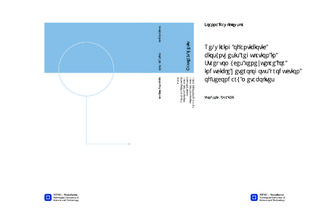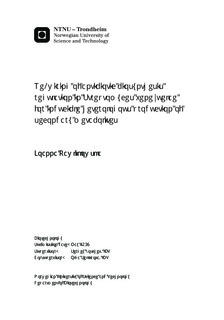| dc.contributor.advisor | Zotchev, Sergey | nb_NO |
| dc.contributor.advisor | Sekurova, Olga | nb_NO |
| dc.contributor.author | Pawlikowska, Joanna | nb_NO |
| dc.date.accessioned | 2014-12-19T13:15:50Z | |
| dc.date.available | 2014-12-19T13:15:50Z | |
| dc.date.created | 2014-12-07 | nb_NO |
| dc.date.issued | 2014 | nb_NO |
| dc.identifier | 769300 | nb_NO |
| dc.identifier | ntnudaim:8537 | nb_NO |
| dc.identifier.uri | http://hdl.handle.net/11250/246164 | |
| dc.description.abstract | Streptomyces venezuelae ATCC10712 which is an object of research investigation during this master thesis belongs to Actinomycetales which are widely recognized as a producer of antibiotics. Secondary metabolites synthesis in S. venezuelae varies depending from the conditions of incubation. If stress factors like ethanol are present in the medium, microorganism switches to production of jadomycin. In normal conditions however, nutrient depletion leads to subsequent synthesis of chloramphenicol. Regulation of aforementioned compounds is precisely, internally regulated by the set of adjacent genes. jadR1 and jadR2 were identified as genes having major influence in these pathways.The idea of this project was to re-engineer the antibiotic biosynthesis regulatory circuit of chloramphenicol and jadomycin in S. venezuelae, in order to make recombinant strain s chloramphenicol production dependent on ethanol stress. Following steps took place to achieve this goal. Firstly, construction of recombinant strain with deletion of jadJ-E structural genes from S. venezuelae chromosome and their replacement with a reporter gene gusA. Another assembly was constructed with the aim of replacing cmlI-X promoter in deletion mutant with jadR1-jadJ promoter region in the chloramphenicol biosynthetic gene cluster. Planning was based on the fact that since those genes are under negative regulation of JadR1 regulator, exchange of the promoter will lead to its activation and subsequent chloramphenicol biosynthesis. Due to the difficulties which arose from the mutations in gusA gene, additional assembly with the deletion of of jadJ-E genes in S. venezuelae with another version of gusA region had to be constructed. Chloramphenicol production was assessed in S. venezuelae mutant carrying substituted promoter by UPLC analysis. Results revealed 5 fold increase of chloramphenicol expression under ethanol shock in recombinant strain, in comparison with wild-type S. venezuelae in the same conditions. When uninduced, mutant produced no chloramphenicol. This experiment was the main objective of this master thesis.In addition, construct for heterologous expression of chloramphenicol antibiotic gene cluster in Streptomyces albus was assembled. Strain was assessed for the production of this antibiotic by UPLC analysis. | nb_NO |
| dc.language | eng | nb_NO |
| dc.publisher | Institutt for bioteknologi | nb_NO |
| dc.subject | ntnudaim:8537 | no_NO |
| dc.subject | MBIOT Bioteknologi | no_NO |
| dc.title | Re-wiring of antibiotic biosynthesis regulation in Streptomyces venezuelae for inducible heterologous production of secondary metabolites | nb_NO |
| dc.type | Master thesis | nb_NO |
| dc.source.pagenumber | 106 | nb_NO |
| dc.contributor.department | Norges teknisk-naturvitenskapelige universitet, Fakultet for naturvitenskap og teknologi, Institutt for bioteknologi | nb_NO |

